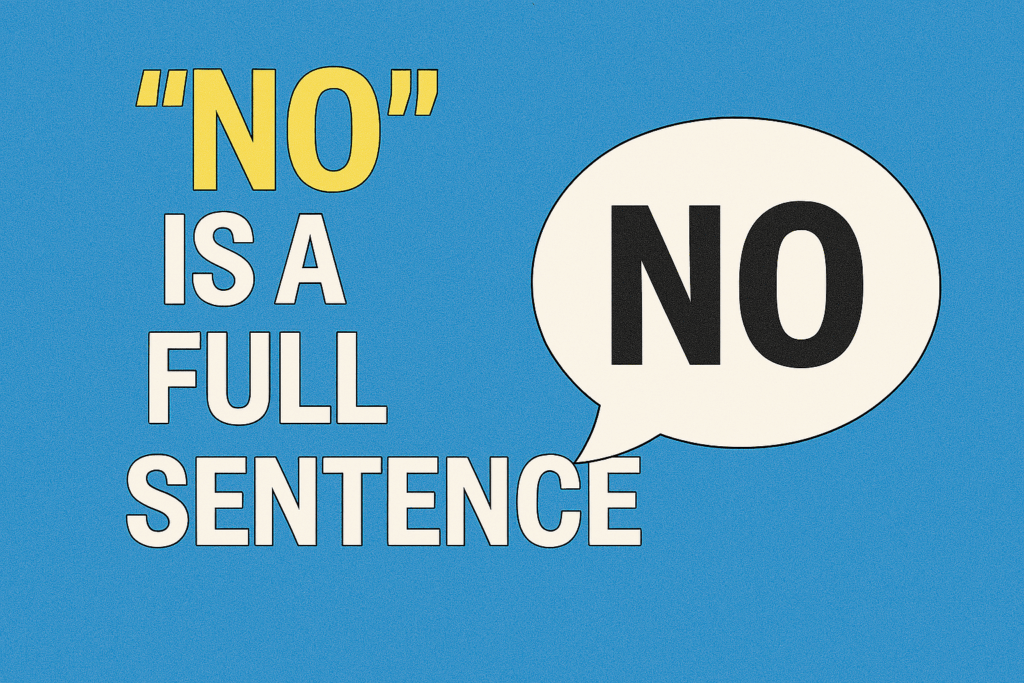In a world that often glorifies hustle, availability, and endless yeses, saying “no” can feel like a radical act. But here’s the truth: “No” is a full sentence. You don’t owe anyone an explanation for protecting your peace or setting boundaries. This simple yet profound statement is a cornerstone of emotional well-being, self-respect, and healthy relationships.
Whether you’re navigating work demands, family expectations, or social pressures, learning to say no—without guilt or justification—is one of the most empowering skills you can develop.
🧠 Why Saying “No” Feels So Hard
Many of us were raised to believe that saying no is rude, selfish, or confrontational. We’re taught to be agreeable, helpful, and accommodating—even at the expense of our own needs. This conditioning leads to:
• Overcommitment: Saying yes to everything leaves little time for rest or personal priorities.
• Resentment: Agreeing to things you don’t want to do builds frustration and emotional fatigue.
• Burnout: Constantly putting others first can drain your energy and mental health.
But here’s the reframe: Saying no isn’t rejection—it’s protection. It’s a way to honor your time, energy, and values.
🔒 The Power of Boundaries
Boundaries are not walls—they’re filters. They help you decide what you allow into your life and what you keep out. Saying “no” is one of the clearest ways to enforce those boundaries.
Here’s what healthy boundaries look like:
• Declining invitations without guilt: “Thanks for thinking of me, but I won’t be attending.”
• Turning down extra work: “I’m at capacity right now and can’t take on more.”
• Protecting your time: “I’m not available for calls after 6 PM.”
Notice how none of these require lengthy explanations. They’re respectful, firm, and clear.
✨ “No” Is a Full Sentence—And That’s Enough
You don’t need to justify your boundaries. You don’t need to explain why you’re unavailable, why you’re tired, or why something doesn’t feel right. “No” is enough.
Here’s why this matters:
• It reinforces self-worth: You’re allowed to prioritize yourself without apology.
• It sets a precedent: Others learn to respect your limits when you enforce them clearly.
• It reduces anxiety: Over-explaining often leads to second-guessing and emotional stress.
As author and therapist Nedra Glover Tawwab puts it, “Boundaries are the distance at which I can love you and me simultaneously.”
🛠️ How to Practice Saying “No”
If you’re new to boundary-setting, here are some practical tips:
1. Start small: Practice saying no in low-stakes situations, like declining a coffee date or skipping a group chat.
2. Use clear language: Avoid vague phrases like “I’ll think about it.” Be direct: “No, I can’t.”
3. Resist the urge to explain: Silence is powerful. Let your no stand on its own.
4. Expect discomfort: It’s normal to feel awkward at first. That doesn’t mean you’re doing it wrong.
5. Stay consistent: The more you say no, the easier it becomes—and the more people respect it.
💬 Boundary Scripts You Can Use
Need help finding the words? Here are a few boundary-setting phrases that honor your peace:
• “No, thank you.”
• “I’m not available for that.”
• “That doesn’t work for me.”
• “I need to prioritize my own needs right now.”
• “I’m choosing to rest instead.”
Each of these is polite, firm, and free of justification.
🌱 The Ripple Effect of Boundaries
When you start saying no, something beautiful happens: you create space. Space for rest, creativity, meaningful relationships, and personal growth. You stop living reactively and start living intentionally.
You also model healthy behavior for others. Friends, family, and colleagues may feel inspired to set their own boundaries when they see you doing it with confidence and grace.
📝 Final Thoughts
Saying “no” isn’t about being difficult—it’s about being deliberate. It’s about choosing what aligns with your values and letting go of what doesn’t. “No” is a full sentence. You don’t owe anyone an explanation for protecting your peace or setting boundaries.
So the next time you feel pressured to say yes, pause. Take a breath. And remember: your peace is reason enough.



